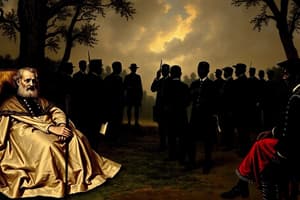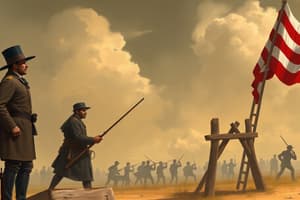Podcast
Questions and Answers
What did the Fugitive Slave Act require from citizens in free states?
What did the Fugitive Slave Act require from citizens in free states?
- To provide shelter for escaped slaves
- To support abolitionist activities
- To assist in the capture and return of escaped slaves (correct)
- To vote on the legality of slavery
The Missouri Compromise allowed for the expansion of slavery into the entire Louisiana Purchase territory.
The Missouri Compromise allowed for the expansion of slavery into the entire Louisiana Purchase territory.
False (B)
Who was a prominent advocate for states' rights and slavery, representing South Carolina?
Who was a prominent advocate for states' rights and slavery, representing South Carolina?
John C. Calhoun
The Compromise of 1850 allowed California to enter the Union as a __________ state.
The Compromise of 1850 allowed California to enter the Union as a __________ state.
Match the following individuals with their respective roles or beliefs:
Match the following individuals with their respective roles or beliefs:
What was the main purpose of the Kansas-Nebraska Act?
What was the main purpose of the Kansas-Nebraska Act?
The Kansas-Nebraska Act resulted in a peaceful resolution to the issue of slavery in the territories.
The Kansas-Nebraska Act resulted in a peaceful resolution to the issue of slavery in the territories.
What was the main reason Dred Scott believed he should be free?
What was the main reason Dred Scott believed he should be free?
Frederick Douglass founded the abolitionist newspaper called the _____ to advocate for the end of slavery.
Frederick Douglass founded the abolitionist newspaper called the _____ to advocate for the end of slavery.
Match the historical figures or concepts with their contributions or roles:
Match the historical figures or concepts with their contributions or roles:
What was the main purpose of 'Uncle Tom's Cabin'?
What was the main purpose of 'Uncle Tom's Cabin'?
John Brown was captured after his raid at Harpers Ferry and was executed for his actions.
John Brown was captured after his raid at Harpers Ferry and was executed for his actions.
What role did Harriet Beecher Stowe's religious appeal play in her argument against slavery?
What role did Harriet Beecher Stowe's religious appeal play in her argument against slavery?
The act that led to violent conflicts in Kansas in the mid-1800s is known as ______.
The act that led to violent conflicts in Kansas in the mid-1800s is known as ______.
Match the following historical figures with their contributions or actions regarding slavery:
Match the following historical figures with their contributions or actions regarding slavery:
The Missouri Compromise prohibited slavery in all territories of the Louisiana Purchase.
The Missouri Compromise prohibited slavery in all territories of the Louisiana Purchase.
What role did Henry Clay play in the context of the Compromise of 1850?
What role did Henry Clay play in the context of the Compromise of 1850?
The Fugitive Slave Law required citizens to assist in the capture of __________ slaves.
The Fugitive Slave Law required citizens to assist in the capture of __________ slaves.
Match each historical figure to their contributions or beliefs regarding slavery:
Match each historical figure to their contributions or beliefs regarding slavery:
What was the major conflict arising from the Kansas-Nebraska Act?
What was the major conflict arising from the Kansas-Nebraska Act?
The Missouri Compromise allowed slavery in territories south of the 36° 30' line only.
The Missouri Compromise allowed slavery in territories south of the 36° 30' line only.
In which two locations was Dred Scott taken where slavery was banned?
In which two locations was Dred Scott taken where slavery was banned?
Match the following historical figures with their contributions:
Match the following historical figures with their contributions:
What was the primary goal of Harriet Beecher Stowe's novel 'Uncle Tom's Cabin'?
What was the primary goal of Harriet Beecher Stowe's novel 'Uncle Tom's Cabin'?
John Brown's raid at Harpers Ferry was successful in starting a widespread uprising against slavery.
John Brown's raid at Harpers Ferry was successful in starting a widespread uprising against slavery.
What was the significance of the Kansas-Nebraska Act of 1854?
What was the significance of the Kansas-Nebraska Act of 1854?
Harriet Beecher Stowe used __________ stories to illustrate the suffering of enslaved individuals in her novel.
Harriet Beecher Stowe used __________ stories to illustrate the suffering of enslaved individuals in her novel.
Match the following individuals with their contributions to the abolitionist cause:
Match the following individuals with their contributions to the abolitionist cause:
Flashcards
Kansas-Nebraska Act
Kansas-Nebraska Act
A law passed in 1854 allowing Kansas and Nebraska to decide whether or not to allow slavery within their borders through popular votes.
Popular Sovereignty
Popular Sovereignty
The principle that allows people in a territory to vote on whether or not to allow slavery, strengthening democratic principles but increasing tensions over slavery.
Bleeding Kansas
Bleeding Kansas
Violent clashes between pro-slavery and anti-slavery settlers in the Kansas Territory, a consequence of the Kansas-Nebraska Act which intensified the debate about slavery.
Frederick Douglass
Frederick Douglass
Signup and view all the flashcards
Emotional Appeal for Abolition
Emotional Appeal for Abolition
Signup and view all the flashcards
Compromise of 1850
Compromise of 1850
Signup and view all the flashcards
Fugitive Slave Act
Fugitive Slave Act
Signup and view all the flashcards
Popular Sovereignty (Compromise of 1850)
Popular Sovereignty (Compromise of 1850)
Signup and view all the flashcards
Henry Clay
Henry Clay
Signup and view all the flashcards
John C. Calhoun
John C. Calhoun
Signup and view all the flashcards
What is "Uncle Tom's Cabin"?
What is "Uncle Tom's Cabin"?
Signup and view all the flashcards
What made Harriet Beecher Stowe's argument against slavery in "Uncle Tom's Cabin" impactful?
What made Harriet Beecher Stowe's argument against slavery in "Uncle Tom's Cabin" impactful?
Signup and view all the flashcards
Who was John Brown and what role did he play in the fight against slavery?
Who was John Brown and what role did he play in the fight against slavery?
Signup and view all the flashcards
Why did the Southern states secede from the Union?
Why did the Southern states secede from the Union?
Signup and view all the flashcards
What was the Compromise of 1850?
What was the Compromise of 1850?
Signup and view all the flashcards
What was the Fugitive Slave Act?
What was the Fugitive Slave Act?
Signup and view all the flashcards
What is Popular Sovereignty?
What is Popular Sovereignty?
Signup and view all the flashcards
What was the Missouri Compromise?
What was the Missouri Compromise?
Signup and view all the flashcards
Who was Henry Clay?
Who was Henry Clay?
Signup and view all the flashcards
What was the Kansas-Nebraska Act?
What was the Kansas-Nebraska Act?
Signup and view all the flashcards
What was the Dred Scott case?
What was the Dred Scott case?
Signup and view all the flashcards
Who was Frederick Douglass?
Who was Frederick Douglass?
Signup and view all the flashcards
How did abolitionists try to win over the public?
How did abolitionists try to win over the public?
Signup and view all the flashcards
What made Harriet Beecher Stowe's argument against slavery in "Uncle Tom's Cabin" so effective?
What made Harriet Beecher Stowe's argument against slavery in "Uncle Tom's Cabin" so effective?
Signup and view all the flashcards
Who was John Brown?
Who was John Brown?
Signup and view all the flashcards
Study Notes
Compromise of 1850
- Allowed California to join the Union as a free state
- Included the Fugitive Slave Act, requiring the return of escaped slaves
- Temporarily eased tensions but exacerbated the debate over slavery, ultimately contributing to the Civil War
Southern and Northern States
- Southern states were slave states (Confederate)
- Northern states were free states (Union)
- Utah and New Mexico allowed slavery through popular sovereignty (citizen vote)
Fugitive Slave Law
- Increased tensions between North and South
- Required citizens of free states to assist in capturing and returning escaped slaves
- Favored slave owners
- Increased activity on the Underground Railroad, as abolitionists aided escaping slaves
- Disturbed Northerners and abolitionists, compelling them to aid in returning slaves
- Court officials received compensation based on judge's decision ($10 if returned, $5 if insufficient proof)
- Penalties for hindering fugitive slave arrest (over $1000 fine and 6 months jail)
Missouri Compromise
- 1820 balance between free and slave states
- Missouri admitted as slave state, Maine as free state
- Slavery prohibited in Louisiana Purchase north of 36°30′ parallel (excluding Missouri)
- Increased tensions, making conflict more likely, eventually leading to the Civil War
Kansas-Nebraska Act
- 1854 law allowing Kansas and Nebraska territories to decide on slavery via popular sovereignty
- Increased tensions, weakened the Missouri Compromise, intensifying the debate over slavery
- Led to violent conflicts in Kansas ("Bleeding Kansas") between pro-slavery and anti-slavery settlers
Dred Scott Decision
- Supreme Court ruling against Dred Scott's freedom
- Based on previous legal handling of slavery
- Declared Dred Scott a slave
- Protected slaveholder's rights
Abolition Movement
- Frederick Douglass, powerful speaker and writer for abolition
- Published autobiographies and the abolitionist newspaper ("The North Star")
- Collaborated with other abolitionists and political leaders
- Abolitionists were disliked by northerners due to increased tensions with the South
John Brown's Actions
- Deeply affected by witnessing enslaved people's suffering
- Active in the abolitionist movement
- Led a retaliatory raid in Kansas (1856), killing five pro-slavery settlers
- Attempted armed rebellion at Harpers Ferry (1859), aiming to seize federal armory, but failed
- Became a martyr for the abolitionist movement
- Increased tensions due to his actions
Election of 1860
- Lincoln's election impacted the South
- Southerners feared slavery was at risk
- Lincoln's Republican Party opposed the expansion of slavery
Civil War
- 1861 conflict between the Union (North) and the Confederacy (South)
- Confederate attack on Fort Sumter in Charleston, South Carolina, triggered the war
- Union fought to preserve the Union, gradually shifting to fighting to end slavery
- Union opposed the expansion of slavery and aimed for a strong central government
- Confederacy prioritized states' rights and protected slavery due to economic importance
Emancipation Proclamation (1863)
- Declared slaves in Confederate states free
- Significant shift in purpose of the Civil War
- Weakened the Confederacy because of its dependence on slavery
- Helped liberate around 3.5-4 million enslaved people by the war's end
Gettysburg Address (1863)
- Lincoln's speech emphasizing equality, national unity, and sacrifices made for freedom
- Inspired Americans to continue fighting for a just nation
Union Generals Sherman and Grant
- Grant known for calm and decisive leadership
- Sherman known for bold and innovative tactics during the war
13th Amendment
- Abolished slavery in the United States
Problems Solved and Unsolved by the Civil War
- Solved: Abolishment of slavery, preservation of the Union, strengthened federal government, civil rights advancements (though delayed)
- Unsolved: Racial inequality and discrimination, economic and social divisions between North and South, political and social tensions during Reconstruction, the legacy of slavery led to systemic problems like sharecropping
Studying That Suits You
Use AI to generate personalized quizzes and flashcards to suit your learning preferences.
Related Documents
Description
This quiz covers the key aspects of the Compromise of 1850, including California's admission as a free state, the implications of the Fugitive Slave Act, and the tensions between Southern and Northern states. Understand how this compromise impacted the national debate over slavery and contributed to the events leading to the Civil War.




